Assine a petição para enviar um correio electrónico à Corte Interamericana de Direitos Humanos
|
|
SAMICO BETWEEN WORLDS
[RUMORS OF WAR IN TIMES OF PEACE]
Dream Box is pleased to announce Samico Between Worlds [Rumors of War in Times of Peace], a solo exhibition of woodcuts by Brazilian master engraver Gilvan Samico in partnership with Grupo Om.
The exhibition Samico Between Worlds [Rumors of War in Times of Peace] presents to the public of New York City fourteen woodcut pieces produced by the artist Gilvan Samico (1928 - 2013) in the period between 1997 and 2010. Curated by Marcio Harum, the exhibition will run in the Lower East Side from February 4th to March 5th, with an opening reception on Saturday, February 4th, from 12 to 6pm.
Focusing on the metaphysics of Samico’s work, the exhibit introduces the oeuvre of one of the most important Latin American artists, whose career comprises 300 exhibitions in 30 different countries, awards in the Venice Biennale and works acquired by MoMA.
Born in Recife, located in the northeastern region of Brazil, Samico and his artworks have been “rediscovered” after his death in 2013. With various solo and collective exhibitions in Brazil, his woodcuts have been featured in the latest biennials that took place in the country. His work stands out and differs from his peers due to its universal language. Tapping from legends and myths while it reinvents the popular art of his birthplace by adding elements and themes from many other cultures, Samico has achieved, according to himself and art critics, what Jung called “Collective Unconscious,” a kind of common knowledge of legends, imagery and symbols from different cultures that are shared among human beings.
“Some people ask me about my fascination for Egyptian art because they see Egyptian influences in my prints. I’ve got nothing to say [in return], unless it is part of my experience in the collective unconscious. I don’t know. It is as if these old stories keep repeating themselves in [our] genes until they reach me. A certain critic once said that my woodcut pieces are impregnated with these essential symbols of popular culture. I think he is right.” - Samico quoted by Tânia Nogueira in the book Mythology and Cordel.
For Júlia Rebouças, curator of the 32nd São Paulo Art Biennial, where 51 of Samico’s artworks were presented, there has been an enormous repercussion among the Biennial audience, an event that evidenced the contemporaneity of his work: “Samico is very current and his work is very much universal. It had a huge impact on the audience and the international curators.” Reports from the Biennial mediators say: “I gave an approach that I found very interesting and beautiful, which was to ask the [visiting] groups what nationality they thought the artist was from. I think it is an interesting approach when we think that Samico takes us back to the archetypical, “original,” symbolic references that could have been from anywhere in the world, from just any remote past (...). Visitors often associate them to card decks, Egyptian drawings and also religious narratives and feminism.”
Considered one of the icons of the Armorial Movement, an art movement that sought to create Brazilian art that would stem from the indigenous, African and European elements that served as the base for his local culture, Samico adopted a more authorial interpretation of his universe in his latest works, which will be presented in Samico Between Worlds [Rumors of War in Times of Peace]. “Please understand, I don’t do illustration. I am tapping from legends to create a new world,” Samico declared.
The curator Marcio Harum, who has been in charge of the São Paulo Cultural Center curatorship, one of the most important institutions of contemporary art in Brazil, added scheduled tarot reading sessions to the exhibition program as a mean of evidencing the recurring identification of Samico’s work with the aesthetics of tarot cards, and connect it to the practice of the artist’s widow, Célida Samico, who is a ballerina, yoga teacher and tarot reader.
Samico Between Worlds [Rumors of War in Times of Peace] is curated by Marcio Harum and produced by Grupo Om, Dream Box Lab and Juliana Freire.
_
Artist: Gilvan Samico
Curator: Marcio Harum
Producers: Grupo Om, Dream Box Lab and Juliana Freire
Art Direction: Gustavo FelipeDuration: February 4th - March 5th
Hours: Wednesday - Friday, 12 to 6pm
Preview: February 4th, 6 - 9pm
Opening Reception Brunch: February 4th, 12-6pm
Location:
319 Grand Street (corner of Orchard Street), 5th Floor
New York, NY 10002
Directions by Train:
F, M, J, Z to Delancey Street Station
B, D to Grand Street Station
Contact: samico@dreambox.nyc
_
SAMICO (1928 - 2013, Recife, Pernambuco) is one of the Brazilian artists whose artworks have been revisited with more intensity at the present time. In 1962, he participated in the XXXI Venice Biennale and, in 2016, in the 32nd São Paulo Art Biennial, among other major exhibitions. An engraver, painter, draftsman, and teacher, Gilvan Samico founded, together with other artists, the Studio Collective of the Modern Art Society of Recife (SAMR) in 1952. He studied woodcut with Lívio Abramo (1903 - 1992) at Escola Artesanato at the São Paulo Museum of Modern Art (MAM/SP) in 1957. One year later, Samico moved to Rio de Janeiro, where he enrolled in an engraving course taught by Oswaldo Goeldi (1895 - 1961) at the School of Fine Arts from the Federal University of Rio de Janeiro (Enba). In 1965, he settled down in Olinda, Pernambuco, and taught woodcut at the Federal University of Paraíba (UFPB). In 1968, he traveled to Europe after winning an award from the Salão Nacional de Arte Moderna (SNAM) and lived there for two years. In 1971, he was invited by Ariano Suassuna (1927 - 2014) to join the Armorial Movement, a cultural movement focused on the popular visual culture of the Northeastern region of Brazil. Through cordel literature and the creative use of woodcut, Samico’s artistic creations are marked by the recovery of the Northeastern folk romancero. His engravings are populated by figures from legends and archetypal narratives, as well as fantastic and mythical animals. Samico’s artworks are part of permanent collections at museums such as the Museum of Modern Art (MoMA), the Museo de Belas Artes da Coruña (Spain), the Museum of Modern Art in Brasilia, the Museum of Modern Art in Rio de Janeiro, the MAMAM in Recife and the Pinacoteca do Estado de São Paulo.
More information: http://www.dreambox.nyc/samicobetweenworlds/
Wednesday, February 15
Walls, Tariffs and Avocados
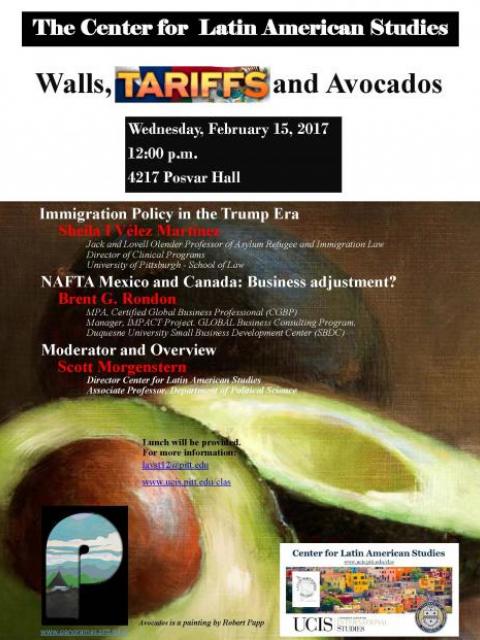
Time:
12:00 pm
Location:
4217 Posvar Hall
Sponsored by:
Center for Latin American Studies along with Panoramas (CLAS)
Cost:
free
Contact:
Luz Amanda Hank
Contact Phone:
8-7391
Contact Email:
lavst12@pitt.edu
Immigration Policy in the Trump Era
Sheila I Vélez Martínez
Jack and Lovell Olender Professor of Asylum Refugee and Immigration Law
Director of Clinical Programs
University of Pittsburgh - School of Law
Sheila I Vélez Martínez
Jack and Lovell Olender Professor of Asylum Refugee and Immigration Law
Director of Clinical Programs
University of Pittsburgh - School of Law
NAFTA Mexico and Canada: Business adjustment?
Brent G. Rondon
MPA, Certified Global Business Professional (CGBP)
Manager, IMPACT Project. GLOBAL Business Consulting Program.
Duquesne University Small Business Development Center (SBDC)
Brent G. Rondon
MPA, Certified Global Business Professional (CGBP)
Manager, IMPACT Project. GLOBAL Business Consulting Program.
Duquesne University Small Business Development Center (SBDC)
Moderator and Overview
Scott Morgenstern
Director Center for Latin American Studies
Associate Professor, Department of Political Science
Scott Morgenstern
Director Center for Latin American Studies
Associate Professor, Department of Political Science
Thursday, February 16
Dictators and Democrats: Masses, Elites and Regime Change
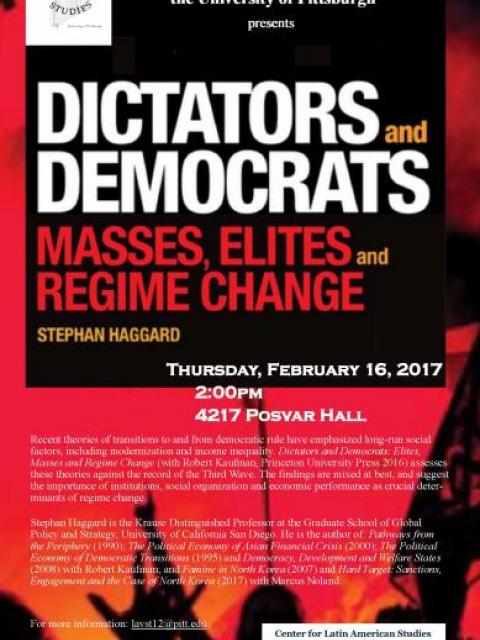
Time:
2:00 pm
Presenter:
Stephan Haggard
Location:
4217 Posvar Hall
Sponsored by:
Center for Latin American Studies
Contact:
Luz Amanda Hank
Contact Phone:
8-7391
Contact Email:
lavst12@pitt.edu
Recent theories of transitions to and from democratic rule have emphasized long-run social factors, including modernization and income inequality. Dictators and Democrats: Elites, Masses and Regime Change (with Robert Kaufman, Princeton University Press 2016) assesses these theories against the record of the Third Wave. The findings are mixed at best, and suggest the importance of institutions, social organization and economic performance as crucial determinants of regime change.
Stephan Haggard is the Krause Distinguished Professor at the Graduate School of Global Policy and Strategy, University of California San Diego. He is the author of: Pathways from the Periphery (1990); The Political Economy of Asian Financial Crisis (2000); The Political Economy of Democratic Transitions (1995) and Democracy, Development and Welfare States (2008) with Robert Kaufman; and Famine in North Korea (2007) and Hard Target: Sanctions, Engagement and the Case of North Korea (2017) with Marcus Noland.
For more information: lavst12@pitt.edu
Monday, February 20
NEW ERA FOR GUYANA: OIL, BORDERS AND RELATIONS WITH THE USA
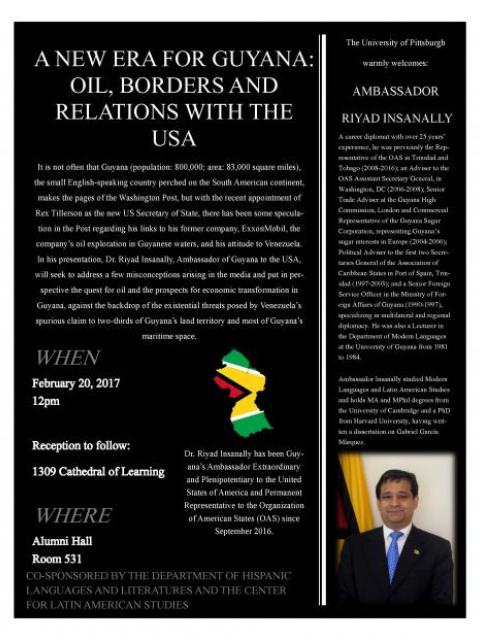
Time:
12:00 pm
Presenter:
AMBASSADOR RIYAD INSANALLY
Location:
531 Alumni Hall and Reception in 1309 Cathedral of Learning
Sponsored by:
Center for Latin American Studies along with Department of Hispanic Languages and Literatures
Contact:
Lucy DiStazio
Contact Phone:
8-7391
Contact Email:
lud3@pitt.edu
It is not often that Guyana (population: 800,000; area: 83,000 square miles), the small English-speaking country perched on the South American continent, makes the pages of the Washington Post, but with the recent appointment of Rex Tillerson as the new US Secretary of State, there has been some specula-tion in the Post regarding his links to his former company, ExxonMobil, the company’s oil exploration in Guyanese waters, and his attitude to Venezuela.
In his presentation, Dr. Riyad Insanally, Ambassador of Guyana to the USA, will seek to address a few misconceptions arising in the media and put in per-spective the quest for oil and the prospects for economic transformation in Guyana, against the backdrop of the existential threats posed by Venezuela’s spurious claim to two-thirds of Guyana’s land territory and most of Guyana’s maritime space.
Tuesday, February 28
El Negro Raúl: Lives and Afterlives of an Afro-Argentine Celebrity (1886-Present)
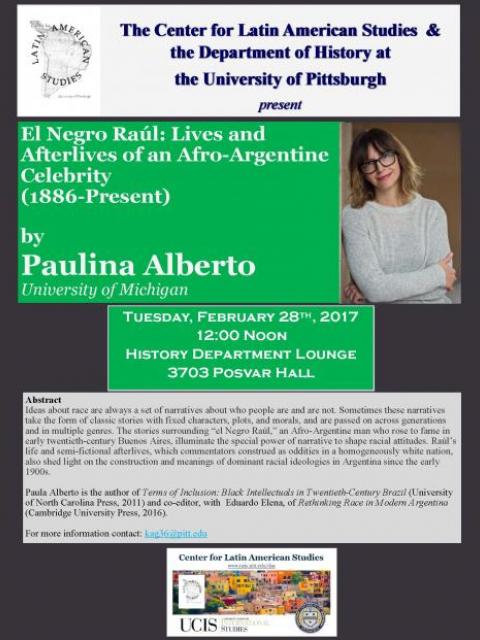
Time:
12:00 pm
Presenter:
Paulina Alberto
Location:
History Department Lounge--3703 Posvar Hall
Sponsored by:
Center for Latin American Studies along with Department of History
Contact:
kag36@pitt.edu
Contact Email:
kag36@pitt.edu
Abstract
Ideas about race are always a set of narratives about who people are and are not. Sometimes these narratives take the form of classic stories with fixed characters, plots, and morals, and are passed on across generations and in multiple genres. The stories surrounding “el Negro Raúl,” an Afro-Argentine man who rose to fame in early twentieth-century Buenos Aires, illuminate the special power of narrative to shape racial attitudes. Raúl’s life and semi-fictional afterlives, which commentators construed as oddities in a homogeneously white nation, also shed light on the construction and meanings of dominant racial ideologies in Argentina since the early 1900s.
Ideas about race are always a set of narratives about who people are and are not. Sometimes these narratives take the form of classic stories with fixed characters, plots, and morals, and are passed on across generations and in multiple genres. The stories surrounding “el Negro Raúl,” an Afro-Argentine man who rose to fame in early twentieth-century Buenos Aires, illuminate the special power of narrative to shape racial attitudes. Raúl’s life and semi-fictional afterlives, which commentators construed as oddities in a homogeneously white nation, also shed light on the construction and meanings of dominant racial ideologies in Argentina since the early 1900s.
Paula Alberto is the author of Terms of Inclusion: Black Intellectuals in Twentieth-Century Brazil (University of North Carolina Press, 2011) and co-editor, with Eduardo Elena, of Rethinking Race in Modern Argentina (Cambridge University Press, 2016).
For more information contact: kag36@pitt.edu
Latin American in Motion:
Pitt Latin American Films
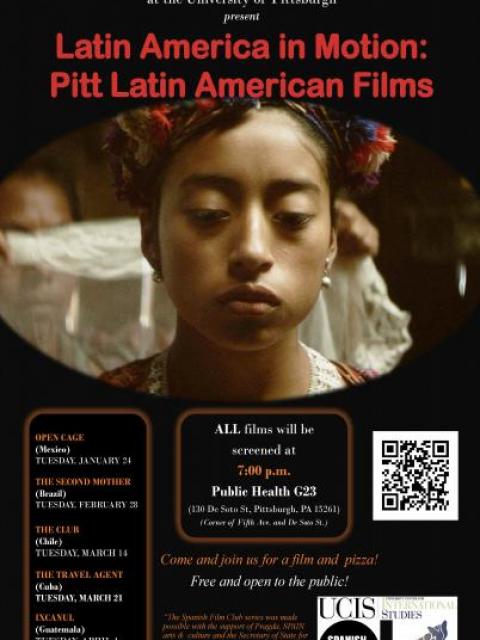
Time:
7:00 pm
Location:
Public Health G23
Sponsored by:
Center for Latin American Studies along with Deaprtment of Hispanic Languages & Literatures, the Year of DIVERSITY at the University of Pittsburgh and Spanish Film Club
Cost:
Free
Contact:
Luz Amanda Hank
Contact Phone:
412-648-7391
Contact Email:
lavst12@pitt.edu
The Center for Latin American Studies and the Department of Hispanic Languages & Literatures at the University of Pittsburgh
present
Latin America in Motion: Pitt Latin American Films
present
Latin America in Motion: Pitt Latin American Films
All Films will be screened at 7:00 p.m.
Public Health G23
130 De Soto St, Pittsburgh, PA 15261
(corner of 5th ave, and De Soto St.)
Public Health G23
130 De Soto St, Pittsburgh, PA 15261
(corner of 5th ave, and De Soto St.)
Come and join us for a film and pizza!
Free and open to the public!
Films:
OPEN CAGE
(Mexico)
TUESDAY, JANUARY 24
(Mexico)
TUESDAY, JANUARY 24
THE SECOND MOTHER
(Brazil)
TUESDAY, FEBRUARY 28
(Brazil)
TUESDAY, FEBRUARY 28
THE CLUB
(Chile)
TUESDAY, MARCH 14
(Chile)
TUESDAY, MARCH 14
THE TRAVEL AGENT
(Cuba)
TUESDAY, MARCH 21
(Cuba)
TUESDAY, MARCH 21
IXCANUL
(Guatemala)
TUESDAY, APRIL 4
(Guatemala)
TUESDAY, APRIL 4
All films are subtitled.
Tuesday, March 14
Latin American in Motion:
Pitt Latin American Films
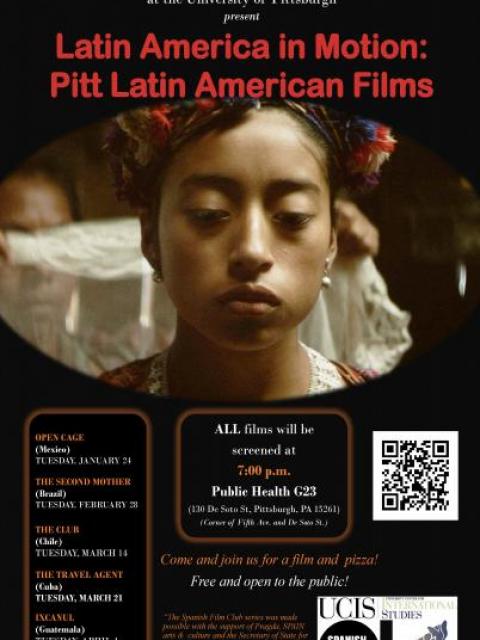
Time:
7:00 pm
Location:
Public Health G23
Sponsored by:
Center for Latin American Studies along with Deaprtment of Hispanic Languages & Literatures, and the Year of Diversity at the University of Pittsburgh and Spanish Film Club by Pragda
Cost:
Free
Contact:
Luz Amanda Hank
Contact Phone:
412-648-7391
Contact Email:
lavst12@pitt.edu
The Center for Latin American Studies and the Department of Hispanic Languages & Literatures at the University of Pittsburgh
present
Latin America in Motion: Pitt Latin American Films
present
Latin America in Motion: Pitt Latin American Films
All Films will be screened at 7:00 p.m.
Public Health G23
130 De Soto St, Pittsburgh, PA 15261
(corner of 5th ave, and De Soto St.)
Public Health G23
130 De Soto St, Pittsburgh, PA 15261
(corner of 5th ave, and De Soto St.)
Come and join us for a film and pizza!
Free and open to the public!
Films:
OPEN CAGE
(Mexico)
TUESDAY, JANUARY 24
(Mexico)
TUESDAY, JANUARY 24
THE SECOND MOTHER
(Brazil)
TUESDAY, FEBRUARY 28
(Brazil)
TUESDAY, FEBRUARY 28
THE CLUB
(Chile)
TUESDAY, MARCH 14
(Chile)
TUESDAY, MARCH 14
THE TRAVEL AGENT
(Cuba)
TUESDAY, MARCH 21
(Cuba)
TUESDAY, MARCH 21
IXCANUL
(Guatemala)
TUESDAY, APRIL 4
(Guatemala)
TUESDAY, APRIL 4
All films are subtitled.
Wednesday, March 15
Encounters with the Amazon's Sacred Vine
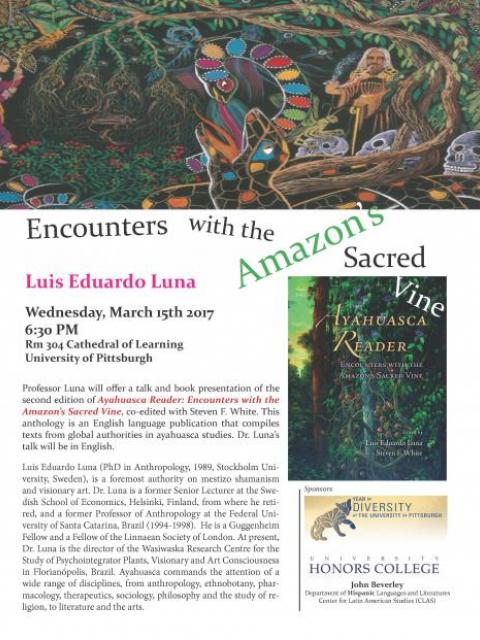
Time:
6:30 pm
Presenter:
Luis Eduardo Luna
Location:
304 Cathedral of Learning
Sponsored by:
Center for Latin American Studies along with Department of Hispanic Language and Literature and John Beverley and the Year of Diversity at the university of Pittsburgh
Contact:
Lucy DiStazio
Contact Email:
lud3@pitt.edu
Professor Luna will offer a talk and book presentation of the second edition of Ayahuasca Reader: Encounters with the Amazon’s Sacred Vine, co-edited with Steven F. White. This anthology is an English language publication that compiles texts from global authorities in ayahuasca studies. Dr. Luna’s talk will be in English.
Luis Eduardo Luna (PhD in Anthropology, 1989, Stockholm University, Sweden), is a foremost authority on mestizo shamanism and visionary art. Dr. Luna is a former Senior Lecturer at the Swedish School of Economics, Helsinki, Finland, from where he retired, and a former Professor of Anthropology at the Federal University of Santa Catarina, Brazil (1994-1998). He is a Guggenheim Fellow and a Fellow of the Linnaean Society of London. At present, Dr. Luna is the director of the Wasiwaska Research Centre for the Study of Psychointegrator Plants, Visionary and Art Consciousness in Florianópolis, Brazil. Ayahuasca commands the attention of a wide range of disciplines, from anthropology, ethnobotany, pharmacology, therapeutics, sociology, philosophy and the study of religion, to literature and the arts.
Sponsors:
Luis Eduardo Luna (PhD in Anthropology, 1989, Stockholm University, Sweden), is a foremost authority on mestizo shamanism and visionary art. Dr. Luna is a former Senior Lecturer at the Swedish School of Economics, Helsinki, Finland, from where he retired, and a former Professor of Anthropology at the Federal University of Santa Catarina, Brazil (1994-1998). He is a Guggenheim Fellow and a Fellow of the Linnaean Society of London. At present, Dr. Luna is the director of the Wasiwaska Research Centre for the Study of Psychointegrator Plants, Visionary and Art Consciousness in Florianópolis, Brazil. Ayahuasca commands the attention of a wide range of disciplines, from anthropology, ethnobotany, pharmacology, therapeutics, sociology, philosophy and the study of religion, to literature and the arts.
Sponsors:
John Beverley
Department of Hispanic Languages and Literatures
Center for Latin American Studies (CLAS)
Department of Hispanic Languages and Literatures
Center for Latin American Studies (CLAS)
Tuesday, March 21
Latin American in Motion:
Pitt Latin American Films
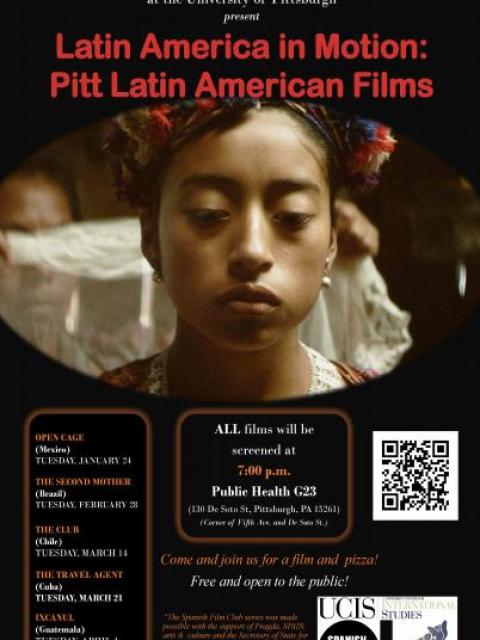
Time:
7:00 pm
Location:
Public Health G23
Sponsored by:
Center for Latin American Studies along with Department of Hispanic Languages and Literature, and the Year of Diversity at the University of Pittsburgh and Spanish Film Club by Pragda
Cost:
Free
Contact:
Luz Amanda Hank
Contact Phone:
412-648-7391
Contact Email:
lavst12@pitt.edu
The Center for Latin American Studies and the Department of Hispanic Languages & Literatures at the University of Pittsburgh
present
Latin America in Motion: Pitt Latin American Films
present
Latin America in Motion: Pitt Latin American Films
All Films will be screened at 7:00 p.m.
Public Health G23
130 De Soto St, Pittsburgh, PA 15261
(corner of 5th ave, and De Soto St.)
Public Health G23
130 De Soto St, Pittsburgh, PA 15261
(corner of 5th ave, and De Soto St.)
Come and join us for a film and pizza!
Free and open to the public!
Films:
OPEN CAGE
(Mexico)
TUESDAY, JANUARY 24
(Mexico)
TUESDAY, JANUARY 24
THE SECOND MOTHER
(Brazil)
TUESDAY, FEBRUARY 28
(Brazil)
TUESDAY, FEBRUARY 28
THE CLUB
(Chile)
TUESDAY, MARCH 14
(Chile)
TUESDAY, MARCH 14
THE TRAVEL AGENT
(Cuba)
TUESDAY, MARCH 21
(Cuba)
TUESDAY, MARCH 21
IXCANUL
(Guatemala)
TUESDAY, APRIL 4
(Guatemala)
TUESDAY, APRIL 4
All films are subtitled.
Tuesday, April 4
Latin American in Motion:
Pitt Latin American Films
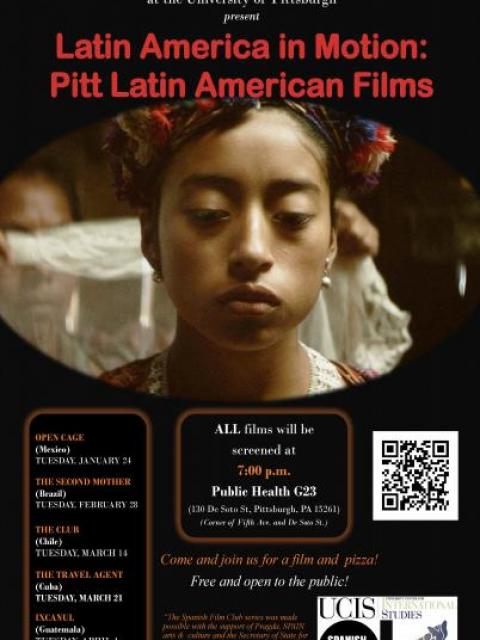
Time:
7:00 pm
Location:
Public Health G23
Sponsored by:
Center for Latin American Studies along with the Department of Hispanic Languages and Literatures, and the Year of Diversity at the University of Pittsburgh and Spanish Film Club by Pragda
Cost:
Free
Contact:
Luz Amanda Hank
Contact Phone:
412-648-7391
Contact Email:
lavst12@pitt.edu
The Center for Latin American Studies and the Department of Hispanic Languages & Literatures at the University of Pittsburgh
present
Latin America in Motion: Pitt Latin American Films
present
Latin America in Motion: Pitt Latin American Films
All Films will be screened at 7:00 p.m.
Public Health G23
130 De Soto St, Pittsburgh, PA 15261
(corner of 5th ave, and De Soto St.)
Public Health G23
130 De Soto St, Pittsburgh, PA 15261
(corner of 5th ave, and De Soto St.)
Come and join us for a film and pizza!
Free and open to the public!
Films:
OPEN CAGE
(Mexico)
TUESDAY, JANUARY 24
(Mexico)
TUESDAY, JANUARY 24
THE SECOND MOTHER
(Brazil)
TUESDAY, FEBRUARY 28
(Brazil)
TUESDAY, FEBRUARY 28
THE CLUB
(Chile)
TUESDAY, MARCH 14
(Chile)
TUESDAY, MARCH 14
THE TRAVEL AGENT
(Cuba)
TUESDAY, MARCH 21
(Cuba)
TUESDAY, MARCH 21
IXCANUL
(Guatemala)
TUESDAY, APRIL 4
(Guatemala)
TUESDAY, APRIL 4
All films are subtitled.
Friday, April 28
UCIS Graduation Ceremony
Time:
3:00 pm
Location:
Ballroom A, University Club
Sponsored by:
African Studies Program, Asian Studies Center, Center for Latin American Studies, Center for Russian and East European Studies, European Studies Center and Global Studies Center
Special Events & Monthly Calendar
The Center for Latin American Studies (CLAS) provides a calendar of events at the beginning of each month. It contains a variety of events, call for papers, job postings, etc.
Cuba has been reforming, or been at the brink of a reform period, perhaps since the revolution. With an aging leadership and now decades-long economic struggles, the pace of change, however, has finally accelerated. Today Cubans can open small businesses, travel abroad, access the internet, and purchase cell phones, microwaves, and (very expensive) new cars.
The annual Latin American Social and Public Policy conference features presentations on social and public policy research in Latin America by students from the University of Pittsburgh and other universities, with comments by University of Pittsburgh faculty.
Featuring music, food, dance, arts, crafts, and children's activities from Latin America and the Caribbean.
For 50 years, CLAS has been dedicated to supporting the study of Latin America's history, cultures, and societies and the continuing challenges and triumphs that the region has experienced. Its primary mission is to develop experts on Latin America who will apply their language skills and knowledge of the countries of the region in their professional careers.



No comments:
Post a Comment